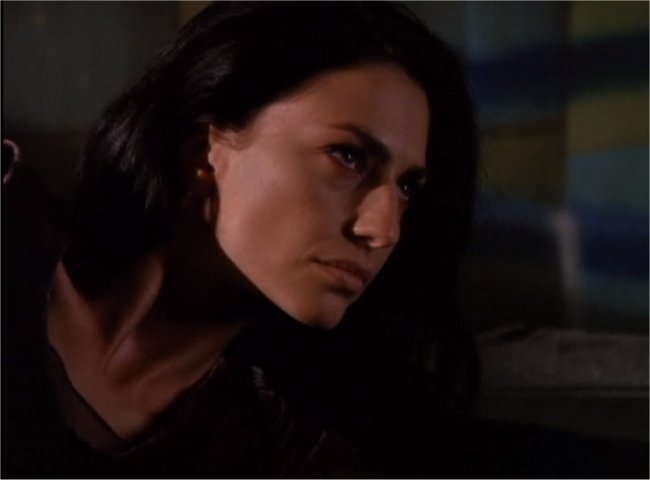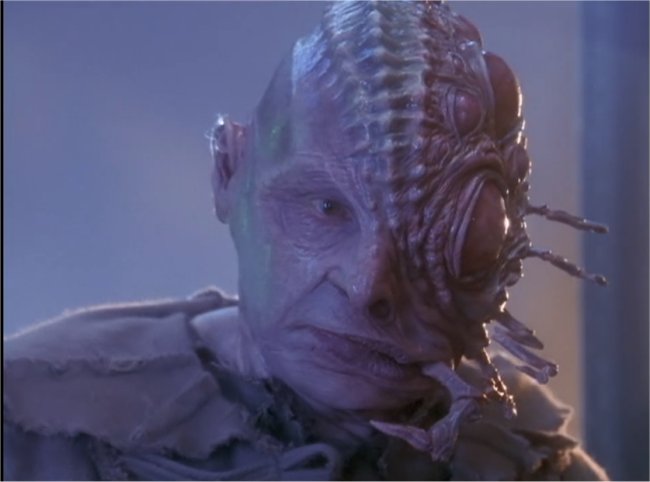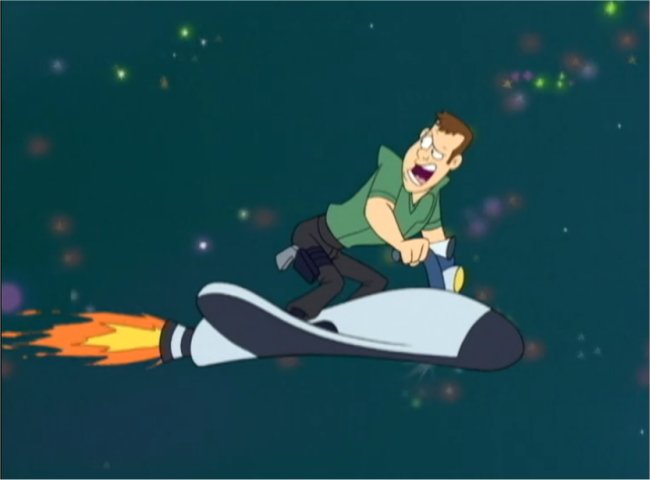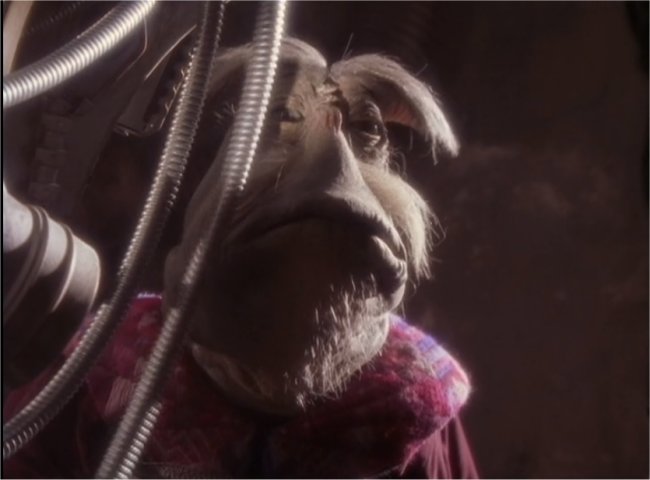
On Farscape, the crew of Talyn head to a planet where it's purportedly possible to contact the dead. But Aeryn spends her time drinking alone in her room . . .

Season Three, Episode Seventeen: The Choice
Aeryn (Claudia Black) is faced with a choice to live without Crichton (Ben Browder) or to die. Well, there are complications, like the other Crichton back on Moya, but he's really not exactly the same guy at this point, having different memories. And even if they did share memories, would we then say one Crichton's death means nothing? However perfect the substitute--in this case, thoroughly--is it really possible to replace a person?

Another complication is that some shady characters on this planet are promising Aeryn they can resurrect the dead Crichton. If it's a con, it's a good one, because dead people are turning up all over the place--Rygel (Jonathan Hardy) spots Aeryn's mother (Lind Cropper), Stark (Paul Goddard) starts to hear Zhaan's (Virginia Hey) voice, and Aeryn runs into a man claiming to be her father (John Gregg).

Though he's a bit worse for wear, among other things.
There's a nice mood established with this episode. Aeryn in her uncharacteristically passive suede dress in a trashed room is set against the graffiti and blinking neon night indicating a clear Bladerunner influence.

Claudia Black's performance is very good as we watch her trying to come to terms with the fact that, while there may be a way to negotiate death's verdict, it may not be healthy to continue down that rabbit hole. One of the figures who tempts her is another extraordinarily effective puppet, a strange baby creature with four eyes.

It's a puppet with many evocative points of articulation.

Crais (Lani Tupu), Rygel, and Stark all make good contributions to the episode. I loved Aeryn mocking Stark and Crais for their desire to sleep with her influencing them and it's very cruel how she condemns Stark's desire to help her as being a manifestation of his libido. Rygel, meanwhile, is almost a father figure to her in this episode, floating up to her from the city while she stands at the edge of the window, making her decision.
. . .
Farscape is available now on Amazon Prime.
This entry is part of a series I'm writing on Farscape for the show's 20th anniversary. My previous reviews can be found here (episodes are in the order intended by the show's creators rather than the broadcast order):
Season One:
Episode 1: Pilot
Episode 2: I, E.T.
Episode 3: Exodus from Genesis
Episode 4: Throne for a Loss
Episode 5: Back and Back and Back to the Future
Episode 6: Thank God It's Friday Again
Episode 7: PK Tech Girl
Episode 8: That Old Black Magic
Episode 9: DNA Mad Scientist
Episode 10: They've Got a Secret
Episode 11: Till the Blood Runs Clear
Episode 12: Rhapsody in Blue
Episode 13: The Flax
Episode 14: Jeremiah Crichton
Episode 15: Durka Returns
Episode 16: A Human Reaction
Episode 17: Through the Looking Glass
Episode 18: A Bug's Life
Episode 19: Nerve
Episode 20: The Hidden Memory
Episode 21: Bone to be Wild
Episode 22: Family Ties
Season Two:
Episode 1: Mind the Baby
Episode 2: Vitas Mortis
Episode 3: Taking the Stone
Episode 4: Crackers Don't Matter
Episode 5: Picture If You Will
Episode 6: The Way We Weren't
Episode 7: Home on the Remains
Episode 8: Dream a Little Dream
Episode 9: Out of Their Minds
Episode 10: My Three Crichtons
Episode 11: Look at the Princess, Part I: A Kiss is But a Kiss
Episode 12: Look at the Princess, Part II: I Do, I Think
Episode 13: Look at the Princess, Part III: The Maltese Crichton
Episode 14: Beware of Dog
Episode 15: Won't Get Fooled Again
Episode 16: The Locket
Episode 17: The Ugly Truth
Episode 18: A Clockwork Nebari
Episode 19: Liars, Guns, and Money, Part I: A Not So Simple Plan
Episode 20: Liars, Guns, and Money, Part II: With Friends Like These . . .
Episode 21: Liars, Guns, and Money, Part III: Plan B
Episode 22: Die Me, Dichotomy
Season Three:
Episode 1: Season of Death
Episode 2: Suns and Lovers
Episode 3: Self-Inflicted Wounds, Part I: Would'a, Could'a, Should'a
Episode 4: Self-Inflicted Wounds, Part II: Wait for the Wheel
Episode 5: . . . Different Destinations
Episode 6: Eat Me
Episode 7: Thanks for Sharing
Episode 8: Green Eyed Monster
Episode 9: Losing Time
Episode 10: Relativity
Episode 11: Incubator
Episode 12: Meltdown
Episode 13: Scratch 'n Sniff
Episode 14: Infinite Possibilities, Part I: Daedalus Demands
Episode 15: Infinite Possibilities, Part II: Icarus Abides
Episode 16: Revenging Angel











































